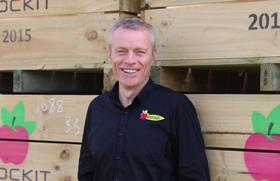
Former managing director of the Havelock North Fruit Company, Phil Alison, has sold his shares in the New Zealand company that developed the miniature snaking apple Rockit.
The company will now trade as Rockit Global Limited, with Alison’s shares sold to private equity investors associated with Pioneer Capital and Oriens Capital for an undisclosed sum.
“Phil made a huge contribution in recognising the potential of the fruit, then establishing and leading the business toward building the Rockit global brand. We will always be greatly appreciative of the work he put in to creating the international platform for the business,” Rockit Global chairman John Loughlin said.
“In 2016, the company exported 77 containers of fruit and earned its maiden profit. We have strong growth plans for 2017 and the years ahead.”
Austin Mortimer has been appointed chief executive of Rockit Global and will lead a Hawke’s Bay-based team in developing international markets for the premium apple.
“Rockit Global Limited is a significant New Zealand success story. It clearly demonstrates how high-quality fruit can be positioned as a premium, value-added product through a robust brand strategy,” Mortimer said. “Rockit Global Limited is now well positioned to continue its rapid growth and capitalise on the substantial grab and go, healthy snack market.”
The Rockit Global board will retain four members of the Havelock North Fruit Company board including Loughlin, Murray Denyer, Steve Saunders and Neil Craig, and will be joined by James Beale of Oriens Capital and Craig Styris of Pioneer Capital.
“It is very positive that growth equity investors of this calibre, from outside the pipfruit industry, are recognising the tremendous potential in Rockit Global Limited and the industry,” said Loughlin. “The new shareholders have experience in growing New Zealand export businesses. They will contribute governance expertise and additional capital to help the company deliver on its ambitious growth plans.
The small-sized apple, positioned as a snack and sold in tubes, is now grown in seven countries and sold in 22 countries.



